The Wheel Deal!
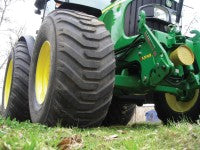 According to turf tyre specialist Trelleborg, low ground pressure tyres were first developed in response to demand from Scandinavian forestry contractors for a way of maintaining traction on their machines without damaging the surface root structure of the trees.
According to turf tyre specialist Trelleborg, low ground pressure tyres were first developed in response to demand from Scandinavian forestry contractors for a way of maintaining traction on their machines without damaging the surface root structure of the trees.
Tyres needed to withstand passing over ground littered with rocks and stumps without punctures causing downtime. Sound familiar? The tyre industry came up with designs of 600 and 700mm tread width, allowing lower inflation pressures to be used, with rounded shoulders to prevent surface damage and a tread pattern capable of transmitting the required power.
Today, the Scandinavian timber industry runs almost exclusively on this type of tyre and its qualities have been appreciated by farmers and, more recently, turf managers.
Its benefits on turf are the ability to travel in wetter conditions, and thus gain a longer working season without damaging the surface or creating ruts that alter its playability. However, there are other challenges for tyres used in modern turfcare - the need to travel at higher speeds on hard roads, and to carry increased loads as tractors and implements get larger.
The soft rubber compounds, which were developed to tread gently on the non-abrasive grass surfaces, may not be tough enough for the job, and manufacturers are increasingly turning to more wear resistant materials.
Over the last ten years, the size of grass tractors has risen significantly in weight and power, particularly in the local authority markets, explains Trelleborg's Technical Support Manager, Jon McGott.
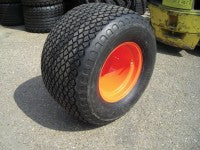 "We have a range of garden tractor wide, low ground pressure tyres which have a soft compound rubber, and a light and flexible carcase. This was developed twenty years ago, but is on the verge of being redundant. With the larger tractors now being used, there is the potential to fit higher capacity loaders, or tow bigger chippers etc., so our wide Twin Implement range, originally developed for agricultural machinery is more appropriate because of its greater load capability, higher speed rating and more suitable, harder rubber compound for roadwork."
"We have a range of garden tractor wide, low ground pressure tyres which have a soft compound rubber, and a light and flexible carcase. This was developed twenty years ago, but is on the verge of being redundant. With the larger tractors now being used, there is the potential to fit higher capacity loaders, or tow bigger chippers etc., so our wide Twin Implement range, originally developed for agricultural machinery is more appropriate because of its greater load capability, higher speed rating and more suitable, harder rubber compound for roadwork."
Totrax supplies specialist tyres and wheels to a number of industries, and product manager, Dave Raynes, explains that groundcare tyres are specified on a decidedly bespoke basis.
"We take the gear ratio of the vehicle in question, the desired width and footprint and then match the data with a tyre from one of a number of manufacturers. This may be the American brand, Carlisle, or a Far East make. The ideal combination for the larger machines, that we are increasingly seeing in the industry, has a large surface contact area and rounded shoulders to avoid scuffing. However, the footprint of the tyre can be restricted by the application - in a football stadium for example, access to the pitch may be via a narrow entrance, which can limit the width of tyres used."
Nordic Tyres is the UK importer for the Finnish Nokian brand, which features radial tyres designed to offer the flat footprint required for turf.
"Tyres for higher horsepower tractors tend to be developed for agriculture rather than groundcare, so it is a matter of taking their best qualities and matching them to the required application," explains the company's Alan Lindsay. "Many flotation tyres are of cross ply construction with the tread and sidewall the same thickness. This gives a 'dome shaped' footprint which can cause rutting and compaction. We use radial tyres which have a radial band around the tread and a separate carcass, allowing it to be as thin as necessary and produce the desired flat footprint."
N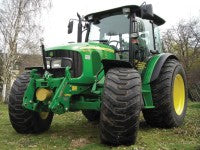 okian's ELS range is described as a true flotation tyre, with a shallow tread and wide cross section to spread the weight of the tractor.
okian's ELS range is described as a true flotation tyre, with a shallow tread and wide cross section to spread the weight of the tractor.
"These are specialist tyres for contractors, groundsmen and turf growers who need to use large tractors on turf for maximum productivity - they are used at Arsenal FC's training ground for example," explains Alan.
However, local authorities may find that they need a harder wearing tyre for travel between work sites, and may also find it difficult to justify the extra cost of special rims required for the ELS.
"The TRI 2 tyre gives a half way house," suggests Alan. "It is kind to turf, but more natural rubber compound in the construction means that it has a longer life even than an agricultural tyre. Its radial construction also makes for a comfortable drive at road speeds."
A further benefit for those looking to get year round use from their tractors comes from the tyre's Nordic origin.
"These tyres were developed to run in severe conditions, and local authorities have reported to us that they coped superbly last winter when used for snow clearing and gritting," Alan reveals.
Cost conscious purchasers may also note that the TRI 2 is also considerably cheaper than the ELS equivalent, as Alan explains.
"A set of ELS tyres can come to £5,500 but, if the tractor is used for more general duties, TRI 2 versions can be supplied for £3,000. However, contractors tell us that specifying the right tyres can be the key to winning the tender, so money is not always the issue."
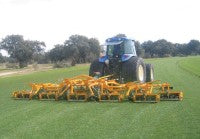 Also of radial construction, Michelin's CargoXbibs are extensively used for cutting in parks and recreation grounds, golf courses and by turf growers, who use them for drilling, treatments and cutting the new turf.
Also of radial construction, Michelin's CargoXbibs are extensively used for cutting in parks and recreation grounds, golf courses and by turf growers, who use them for drilling, treatments and cutting the new turf.
Spokesman Paul Cordle points out: "We don't specifically make tyres for grasscare.In my experience, most of the proprietary products are of cross ply construction, which suffer from punctures and heat build up at current road speeds. The CargoXbib can put down a flat footprint, which significantly reduces damage to the turf."
Other features of this tyre include a large block tread pattern and rounded shoulders to avoid scuffing on turns. It can be run at low ground pressures and, due to its agricultural heritage, the range of sizes and carrying capacities are more than adequate for groundcare needs.
The specialist dealer's view
Choosing turf tyres for a specific task can be a complex decision, according to Andy Hipkin of leading supplier Fieldens.
"Whilst small tyres for compact tractors are relatively straightforward, as horsepower increases, many factors have to be taken into consideration. These include the amount of roadwork to be carried out, the nature of the turf itself and the load the tyre has to carry. Some purchasers need tyres to fulfil more than one role, such as golf course contractors who use the same tractor for construction and for the ongoing maintenance. Every application and every tractor is different and, therefore, it is best to contact a tyre specialist."
Some machinery manufacturers, including John Deere and New Holland, offer a choice of tyres at the time of purchase, but many prefer to leave it to the customer's local dealer.
And, whilst some of the agricultural tyre manufacturers have turf models in their range, Andy suggests that there is more choice from specialist suppliers including Trelleborg, Nokian and Titan.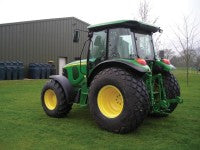
"The most popular tyres we sell are from Titan, and many of the turf tyres supplied as standard with new machinery are sourced from this company," says Andy. "They offer two basic types of turf tyre. The Torc Trac for the rear is based on the old diamond tread pattern, but is more of a block pattern these days, putting an increased percentage of the tyre's surface area on the turf. At the front is the Multi Trac which is, essentially, an overgrown garden tractor tyre. They are simple designs but have been successful for football, golf and a range of other sports."
Fieldens works closely with the end user and, in some cases, will even customise tyres to meet their needs - see the image of a Trelleborg grass tyre with the tread hand cut by the company!
Tyre sourcing and care - case studies
John Deere's Henry Bredin suggests that, while the company offers a choice of turf tyres on its groundcare tractors, the local dealer is often able to help with more specialist requests.
"We have ongoing agreements with some of the leading racehorse trainers and racecourses, and dealers work closely with them to source the ideal tyre for their needs," he explains.
Ben Burgess Ltd at Newmarket supplies John Deere tractors to Jockey Club Estates, which owns Newmarket Racecourse, and to Godolphin Racing, the massive training set-up which produces thoroughbreds for Sheikh Mohammed.
Groundcare specialist Mike Taylor explains: "These customers use larger tractors to cover the extensive areas of grass involved - including Deere's 80-155hp 6030 series at Godolphin, so they need good tyres to avoid scuffing and compaction. Both Michelin and Trelleborg tyres have proved themselves on larger tractors in the turf growing industry, so I can be confident that they are suitable for this application. It is best to avoid tyres with too chunky a tread for this type of work as they can damage the turf.
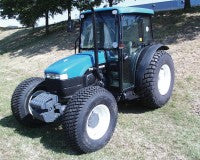 "Although the tyres need to carry loads, the temptation to use wider and wider tyres should be avoided as that just flattens a larger area of grass. The tyres also need to be versatile too, as the tractors are used for a range of jobs, from verti-draining and mowing to towing irrigators," he adds.
"Although the tyres need to carry loads, the temptation to use wider and wider tyres should be avoided as that just flattens a larger area of grass. The tyres also need to be versatile too, as the tractors are used for a range of jobs, from verti-draining and mowing to towing irrigators," he adds.
At John O' Gaunt Golf Club in Bedfordshire, workshop manager Stuart Hall mainly relies on tyre specialist, Totrax, or his main machinery supplier, Toro, to meet his tyre needs.
"Totrax offers a range of tyres if we need anything different from the standard models fitted to the machines, but for the larger tractors and trailers we go to ATS," he explains. "Due to the volumes of tyres that they handle, they are able to be very competitive on price - we had been quoted £800 for a particular large tyre, and their price was £300."
Most repairs can be handled in house in the club's well equipped workshop, but Stuart points out that larger tyres need to be inflated in a safety cage, and for this, truck and agricultural mobile tyre service On Site Tyres of Eaton Socon provides an efficient service.
"There is a safety issue with larger tyres, and I am not trained as a tyre fitter, so I prefer to leave repairs to the experts," he says.
Telford and Wrekin Council contracts out its tyre management to local company, Chris Hardy Tyres. Workshop manager Dave Robinson explains: "We have such a range of vehicles, from refuse lorries to sweepers and grounds maintenance machines, that it would be too time consuming to manage our tyre requirements in house. Chris looks after tyre sourcing, repairs and replacement all for a fixed fee."
This includes a guaranteed response time for puncture repairs, either in the workshop or out on site.
"We cannot afford to have machines and drivers stood down for two or three hours, as we would be unable to fulfil the terms of our own contracts," Dave says. "Using a local company means a quick response; fitters also come into the workshop when shifts finish in the afternoon to check tyre condition and replace any worn units."
Any new machines added to the fleet are notified to Chris Hardy, and their tyre specification recorded to allow re-cutting or replacement to be rescheduled.
Contractors, Agripower, specialise in construction and renovation of natural and synthetic tyres, and Grant Holmes explains that large tyres capable of carrying substantial weight without damaging the turf are essential.
"Most of our 25-strong fleet of tractors are 80-110hp, and we specify Alliance tyres at the time of purchase. They offer low ground pressure, but also last a long time."
Ongoing grounds maintenance contracts are usually fulfilled using compact tractors or ride-on mowers, but major renovation work, such as verti-draining and topdressing, requires the high horsepower and light tread of the Alliance-shod Kubota and New Holland tractors.
Agricultural tyres are also used for heavy construction work, and here Agripower specifies Michelins, as Grant explains: "We still need a light tread and minimal footprint. Michelins are more expensive than other brands, but last longer in conditions where they are required to carry heavy weights and work on stony soils."
Feeling flat?
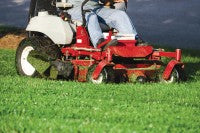 Andy Hipkin suggests that punctures are less of a problem these days, notably since a lot of tyres are tubeless designs which resist punctures.
Andy Hipkin suggests that punctures are less of a problem these days, notably since a lot of tyres are tubeless designs which resist punctures.
"However, the best way to avoid punctures is to make sure that the tyre is suitable for its application. Customers who try to cut corners and use the wrong tyre tend to spend more on puncture repairs."
Polyeurethane tyres are another option, and come in particularly handy for machines that are exposed to rougher conditions, such as commercial mowers or trailed implements.
Official UK distributor for the Amerityre brand, Puncture Proof Tyres, James Bowett, outlines the advantages of this type of tyre.
"These are not filled tyres, but made of 100% polyeurethane, so offer a lighter tread on turf, eliminating the downtime associated with mending punctures and checking inflation pressures. As the height of cut on this type of mower is usually set on the wheels, using a solid tyre also keeps the finish consistent across the working width."
Fitting does require a special tool, which can be purchased for larger workshops, or tyres can be fitted by the company's network of dealers. A range of tread patterns and tyre sizes is available and James comments that the choice is expanding all the time. Prices are said to compare well with a pneumatic tyre and are less than the equivalent filled tyre. A further advantage, according to James, is that they are 'green'.
"Polyurethane can be landfilled, or reground and re-used in other products, avoiding the disposal issues associated with rubber tyres," he explains.
Punctures can be an issue for construction contractors running on flinty soils, particularly if they are using low ground pressure tyres on a machine which will also be deployed for the maintenance of the new turf. However, Dave Raynes of Totrax points out that most of the modern flotation tyres used on larger tractors have ply ratings of 12/15, which can help avoid punctures.
"But where they are an issue, tyres can be filled with OKO sealant, which is forced into the hole in the event of a puncture, blocking it up and preventing deflation. Alternatively, the entire chamber of vulnerable tyres can be filled and the tyre cured, but this does add weight, so is not suitable for all machines. We are looking at lighter solutions for sealing tyres in the future" says Dave Raynes.
